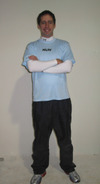
Most runners who lift weights do it wrong. If you do it right, lifting will make you faster, stronger, more balanced, and more resistant to injury.
Most runners I've met do routines that are totally derivative of bodybuilding, and they do it with super light weights – for “endurance”. Even worse, most runners I've met “don't lift legs” because they “get enough work on their legs running”. It's not their fault, it's just that in the fitness world most “common knowledge” is exactly the opposite of what actually works.
Myth #1: If I run, I've got my legs taken care of.
The truth is that if all you do is run, at some point you are bound to develop running specific muscle imbalances. I've trained four marathon runners and a half marathon runner who all had hurting knees because running specific muscle imbalances were pulling their knee caps off to the side. Do your knees hurt? We can fix that.
What to Do:
A good balance of squats, lunges, one legged squats, and deadlifts will give your legs a great balance of strength.
If you compete as a runner, you'd do well to mix it up with all of these movements in the off season, up to three times per week. For any sport, the off season is the time to do some lifting contrary to your normal training, to balance out muscle imbalances, and to give your body a rest from your normal training. During the competitive season you could back off to once a week, and stop weight training completely during the championship stretch and the end of your taper.
If you don't compete, you could lift a couple times per week year round. Or you could have a virtual season where you run more, and an off season where you cross train and lift more, and run less. The human body responds really well to cycling of intensity and adaptation, and you can find that doing these “virtual seasons” in your training will not only make you a better runner, but it helps to keep training fun and interesting.
Myth #2: I know how to lift weights – 3 sets of 10, curls, tricep kickbacks, leg press, ect.
Step away from the mirror! Watching yourself do bicep curls and isolating that bicep will do you no good. Many of the standard gym exercises like curls and tricep kickbacks do a very little for sports performance. Anything done on a machine is totally worthless for a runner, unless it's for rehab purposes. Don't even get me started on the leg press machine.
What to Do:
First, do just about everything with free weights. Second, focus on movements, not muscles. The whole idea of “working my bicepts” is a bodybuilding idea, that has nothing to do with running. Athletics has to do with working in coordinated movements, which is the opposite of isolating muscles.
You want to look at the six basic human movement patterns, and base your weight training around them. The movements are:
1.)Squat (squats, lunges, deadlifts, jumps, kettlebell Swings)
2.)Push (pushups, bench press, dips)
3.)Pull (pullups, rows, rope climbs)
4.)Twist (cable rotations, full contact twists, hitting a heavy bag)
5.)Bend (deadlift, back extension, ball slam, hitting a tire with a sledge hammer, kettlebell Swings)
6.)Run (you've got this one covered)
Find a powerlifter or Olympic Weightlifter to teach you how to squat correctly, and then say “no” to the leg press machine forever.
Myth #3: Weight Training Will Make Me Big And Bulky
Not with all the running you are doing. Distance running is extremely catabolic, meaning it breaks down muscle. You aren't going to put on any extra bulk if you're doing much running at all. In fact if running over 30 miles per week, it's probably impossible to add any bulk.
And then there is the other side. What if you are a marathon runner and you want to add some muscle, what do you do? Well, for starters, stop running marathons. Cut down on your distance, and start doing more sprinting. Ever see a 200 meter runner or a 400 meter runner? What is the difference between a sprinter's body and a marathon runner's body? About 20lbs of muscle.
What to Do:
If you want the best of both worlds, train on a four day cycle: 1.) Distance Run, 2.) Speed Work at the Track, 3.) Weight Training, 4.) Rest. Rinse and repeat. You can be the rare runner with endurance, speed, and muscle.
Myth #4: Weight Training Won't Help My Running
Weight training, when done right, can not only make you faster, it can also be great cross training for endurance. And you've probably guessed by now that my routine for endurance does not consist of bicep curls for 30 reps.
One of the best ways to do weight training in a way that will add speed and endurance to a runner is to do workouts “for time”. What I mean is to have a certain amount of work to do, and then set a stopwatch to time how long it takes to complete it, like a race. The alternate version is to have a set time limit, and to see how many times you can complete a circuit in that time limit.
Example:
how many rounds can you complete in 25 minutes, of :
250 Meter Row
10 Burpees
5 Split Squats each leg
50 yard bear crawl
You'll notice when you do this workout that not only are your muscles getting a workout, but that it's extremely cardiovascular. Being a runner, you'll actually be shocked how cardiovascular this workout is. The majority of people working out can't do 4 rounds in 25 minutes.
The cardiovascular nature of this workout will spill over into your running, making this every bit as good an option for crosstraining as swimming or biking is. The push/pull/squat action will do an amazing job of balancing out your running specific muscle imbalances (squats) and the runner's natural upper body weakness (with the pushups in the burpees and pulling action in the rowing). Prepare to look hotter, feel stronger running, and sprint faster.
 By Josh Hillis
By Josh Hillis
Author of How To Lose The Stubborn Seven Pounds: Take Your Body from Good to Rockstar.
National Academy of Sports Medicine Certified Personal Trainer (NASM-CPT) and Performance Enhancement Specialist (NASM-PES)
Russian Kettlebell Challenge Certified Instructor (RKC) and Combat Applications Specialist (RKC/CAS)
www.joshsgaragedenver.com
© Joshua Hillis 2006
How can one loose arm flab?
Thanks for putting this great information out there Josh, and really telling it like it is – makes for a refreshing change to counteract much of the *garbage* uploaded by others.
To be honest, I’m often online reading other’s blogs with the idea and scope of forming some Joint Venture partnerships in the future. This blog kind of stopped me in my tracks because it rang so true for me.
When I was training for my last marathon – I too was forced to rest up for a while because my knee caps were being pulled off-center as a result of the training. The weight training program I then adopted help sort this out a treat.
The compound exercises you specify to counteract this imbalance are right on target and I thank you for reminding me of it (it’s something that’s reared it’s head again recently)
Anyhow, I’ve made a note of your URL and I’ll check back again some time in the future.
Thanks again and best of luck to you.
Matt Carter
http://www.honestmusclegain.com
Thanks Matt!
One other technique to help runners who are reluctant to “lift” weights: have them hold heavy weights in the contracted position, like the top position of leg extensions. Mike Mentzer described this technique and the amazing strength carryover he discovered in his clients.
It may be a useful way to overcome a typical runner’s resistance to “lifting” weights. Hope it helps.
Great article Josh. You would think that most of this is common information but many runners have a lot of misconceptions when it comes to their own program design.
http://www.athletesacceleration.com
Thanks Josh. This data was very useful. I am getting more serious about running but at the same time want to continue with my weight training. My goal is to have a good amount of lean muscle but also high endurance and able to run distances.
Thanks again!
Luke
Great information. Although I am not an avid runner, I occasionally jog along with diet and exercise. Thanks
what about people who want to run marathons
but loose too much weight because of genetics is there a program of weights and
diet where this could be minimized
Hi Mike,
I think it is very realistic to expect fat loss when training for a marathon. It’s also very possible to train and preserve your muscle mass.
http://www.fatlosstoptips.com/how-to-lose-fat-not-muscle/